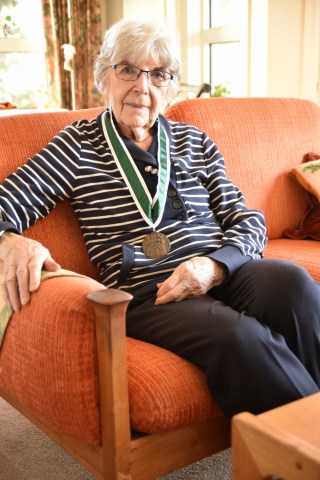
Bury’s award was administered by Status of Women Canada.
On Oct. 19, Betsy Bury was awarded the Governor General’s Award in Commemoration of the Persons Case for her contributions to gender equality and the implementation of universal health care, a cause that Saskatchewan’s former premier Tommy Douglas promoted.
As a proponent of universal health care, an advocate of women’s rights, a lifelong learner and a World War II veteran, Bury has dedicated her time to bettering society.
In light of winning this Governor General’s award, she reflects on her lifetime achievements and explains that ensuring others have equal rights and benefits has always been a driving force behind her activsm.
“My motivations for the work I have done throughout out my life [have] always been to make things better for people around me, because I was always aware of many folks who just didn’t have it quite as good as I did, and I was just lucky. So, I actually have always worked towards that,” Bury said.
Bury is currently taking a course through Saskatoon Seniors Continued Learning Inc. in partnership with the College of Arts and Science titled Canada’s Political Parties: From Macdonald to Trudeau II. Bury believes that students must educate themselves about how difficult it can be to establish services like universal health care, a struggle she understands as a long-time advocate for such care.
“I think there are a lot of people who didn’t know the struggles that it took to get universal health care into Saskatchewan and have taken it more or less for granted that it is here to stay,” said Bury. “None of these programs are here to stay. There’s always someone who wants to do something with it.”
Bury worked diligently for the advancement of women’s rights, both provincially and nationally, and she is credited as one of the pioneers who helped establish the Saskatoon Community Clinic. She went on to help launch Planned Parenthood Saskatoon, now known as Saskatoon Sexual Health.
Bury reflects on her many years as an activist and explains that she now focuses her time on getting constituents involved in voting, as she believes it is an effective way to enact beneficial policies like the ones she has worked on throughout her life.
“Usually, in elections, I take a list of people and I phone them and try to get them convinced to go. I still feel people have to be involved with what’s going on in the government. That’s where the decisions are made, and that’s what makes change,” Bury said. “You are not going to get betterment unless you convince somebody in the government to change the policy.”
Bury says that she is optimistic for the new generation of student activists, as they are politically involved in creating change in the community. She hopes to see the millennial generation taking more action, both politically and within the community, by rallying for issues that matter to them.
“Are [the students] getting the kind of service they need? And if not, … take that issue up yourself. Don’t just think about it. Do something about it,” Bury said. “We all have to do our part to make a better society, and that’s where I am hopeful for you young people finally having interest. The millennial group are the people I am counting on being the future leaders of our country.”
—
Revathi Nair
Photo: J.C. Balicanta Narag / Photo Editor